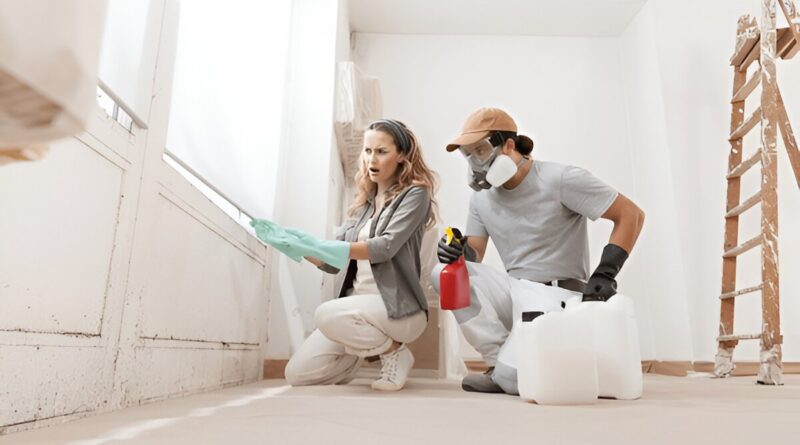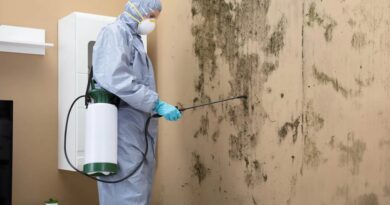Professional Commercial Mold Remediation Services in NJ – Business Safety First
Mold growth in commercial spaces can pose significant health risks and lead to costly damages. For businesses in New Jersey, understanding the importance of professional commercial mold remediation services is crucial. This article delves into the various aspects of mold remediation, emphasizing the need for timely intervention, the processes involved, and the benefits of hiring experts in the field.
Understanding Mold and Its Impact on Businesses
Mold is a type of fungus that thrives in damp environments. It can grow on various surfaces, including wood, drywall, and carpets. The presence of mold in commercial properties can lead to several issues:
- Health Risks: Mold spores can trigger allergic reactions, respiratory problems, and other health issues in employees and customers.
- Structural Damage: Mold can weaken the structural integrity of buildings, leading to costly repairs.
- Legal Liabilities: Businesses may face legal repercussions if mold is found on their premises, especially if it affects the health of employees or customers.
Common Sources of Mold Growth
Understanding where mold typically thrives can help businesses take preventive measures. Common sources include:
- Water Leaks: Leaky roofs, pipes, or plumbing fixtures can create a moist environment conducive to mold growth.
- High Humidity: Areas with high humidity levels, such as bathrooms and kitchens, are more susceptible to mold.
- Poor Ventilation: Insufficient airflow can trap moisture, allowing mold to flourish.
Signs of Mold Infestation
Recognizing the signs of mold is essential for timely remediation. Common indicators include:
- Visible Mold Growth: Dark spots or patches on walls, ceilings, or floors.
- Musty Odors: A persistent, unpleasant smell often indicates mold presence.
- Water Damage: Stains or discoloration on surfaces can signal underlying moisture issues.
The Importance of Professional Mold Remediation
When mold is detected, it is vital to act quickly. Professional commercial mold remediation services offer several advantages:
- Expert Assessment: Trained professionals can accurately assess the extent of mold damage and identify the source of moisture.
- Effective Removal: Experts use specialized equipment and techniques to safely remove mold and prevent its return.
- Health Protection: Professionals follow safety protocols to protect themselves and occupants from exposure to mold spores.
The Cost of Neglecting Mold Issues
Failing to address mold problems can lead to significant financial repercussions for businesses. Potential costs include:
- Repair Expenses: Structural repairs can be costly, especially if mold has compromised the integrity of the building.
- Health-Related Costs: Employee health issues resulting from mold exposure can lead to increased healthcare costs and lost productivity.
- Legal Fees: Businesses may face lawsuits or fines if mold is found to be a health hazard.
The Mold Remediation Process
Understanding the mold remediation process can help businesses appreciate the value of professional services. The process typically involves several key steps:
1. Inspection and Assessment
The first step in mold remediation is a thorough inspection of the property. Professionals will look for visible mold, assess moisture levels, and identify potential sources of water intrusion.
2. Containment
To prevent the spread of mold spores during the remediation process, professionals will establish containment areas. This may involve sealing off affected areas and using negative air pressure to keep spores from spreading.
3. Air Filtration
Specialized air filtration equipment, such as HEPA filters, is used to capture airborne mold spores. This step is crucial for improving indoor air quality during the remediation process.
4. Mold Removal
Professionals will use antifungal and antimicrobial treatments to eliminate mold colonies. In cases of severe infestation, it may be necessary to remove and dispose of contaminated materials, such as drywall or carpeting.
5. Cleaning and Restoration
After mold removal, affected surfaces are cleaned and restored. This may involve repairing or replacing damaged materials and ensuring that the area is safe for occupancy.
6. Final Inspection
Once the remediation process is complete, a final inspection is conducted to ensure that all mold has been removed and that the area is safe for use.
Choosing the Right Mold Remediation Company
Selecting a reputable mold remediation company is essential for effective results. Here are some factors to consider:
1. Experience and Expertise
Look for a company with a proven track record in commercial mold remediation. Experienced professionals will have the knowledge and skills to handle various mold situations.
2. Certifications and Training
Ensure that the company’s technicians are certified by recognized organizations, such as the Institute of Inspection, Cleaning and Restoration Certification (IICRC). This certification indicates that they have received proper training in mold remediation techniques.
3. Comprehensive Services
Choose a company that offers a full range of services, including inspection, remediation, and post-remediation testing. This ensures that all aspects of mold removal are covered.
4. Customer Reviews and Testimonials
Research customer reviews and testimonials to gauge the company’s reputation. Positive feedback from previous clients can provide insight into the quality of service offered.
Preventing Future Mold Growth
Once mold has been remediated, it’s essential to take steps to prevent future growth. Here are some effective strategies:
1. Control Humidity Levels
Maintaining indoor humidity levels below 60% can help prevent mold growth. Consider using dehumidifiers in areas prone to moisture.
2. Improve Ventilation
Ensure that your commercial space has adequate ventilation. This can help reduce moisture buildup and improve air circulation.
3. Regular Inspections
Conduct regular inspections of your property to identify potential moisture issues before they lead to mold growth. Early detection is key to effective prevention.
4. Address Water Leaks Promptly
Any signs of water leaks should be addressed immediately. Repairing leaks can help eliminate the moisture that mold needs to thrive.
The Role of Insurance in Mold Remediation
Understanding your insurance coverage is crucial when dealing with mold issues. Here are some key points to consider:
1. Coverage for Mold Damage
Not all insurance policies cover mold damage. Review your policy to determine what is included and consider adding mold coverage if necessary.
2. Documentation of Damage
In the event of a mold infestation, document the damage thoroughly. Take photos and keep records of any repairs or remediation efforts, as this can be helpful when filing an insurance claim.
3. Working with Professionals
Many mold remediation companies can assist with the insurance claims process. They can provide documentation and estimates that may be required by your insurance provider.
Conclusion
In conclusion, professional commercial mold remediation services are essential for maintaining a safe and healthy environment in New Jersey businesses. By understanding the risks associated with mold, recognizing the signs of infestation, and taking proactive measures, business owners can protect their properties and ensure the well-being of their employees and customers. Investing in professional remediation services not only addresses existing mold issues but also helps prevent future growth, safeguarding the integrity of your business for years to come.
For more information about Commercial Mold Remediation Services in New Brunswick New Jersey please contact:
Business Name: New Jersey Mold Specialist
Address: 92 Bayard St # 203, New Brunswick, NJ 08901
Phone Number: (732) 973-9352
Website: https://njmoldspecialist.com/
Google Map: https://maps.app.goo.gl/kg1JHzNPLm666hW3A



